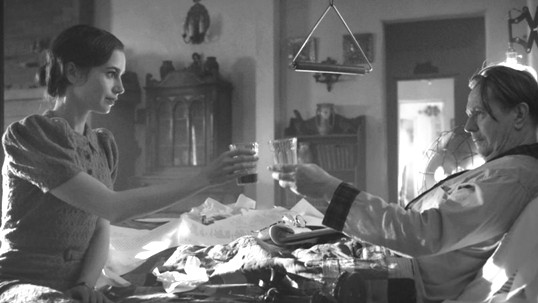 Mank, the latest film from director David Fincher, centers on the Hollywood writer and curmudgeon Herman Mankiewicz, nicknamed “Mank” for short, and the circumstances surrounding his writing of the original screenplay for Orson Welles’ classic film Citizen Kane.
Mank, the latest film from director David Fincher, centers on the Hollywood writer and curmudgeon Herman Mankiewicz, nicknamed “Mank” for short, and the circumstances surrounding his writing of the original screenplay for Orson Welles’ classic film Citizen Kane.
In 1940, after a serious car accident, Mankiewicz is put up to convalesce in a Victorville, California bungalow. Confined to a bed with his leg in a cast, looked after by a nurse, and dictating to an English secretary assigned to him by Welles, he gradually cobbles together a script based on his personal knowledge of the powerful millionaire publisher William Randolph Hearst. With only sixty days to finish, he finds a way to access pain medication and have a case of whiskey delivered to the cottage, which he thinks he needs in order to complete the work. Interspersed with this framing narrative are flashbacks to Mank’s career in 1930s Hollywood.
Mank is played by Gary Oldman, who is twenty years older than his character was in 1940, and even older than the man in the Hollywood flashbacks. It is, however, a bravura performance. He creates a spell on screen: this alcoholic, compulsive gambler, and brilliantly caustic wit comes to vivid life. By making this man the hero of the picture, a character that dominates every scene, the film also romanticizes him and makes him a larger than life figure, much more admirable than the real Mankiewicz, and this is our first clue to the movie’s unconventional strategy. Mank is a film about the old way of making movies in Hollywood, and as such it bends the facts the same way that old movies did in order to dazzle audiences.
David Fincher seems to have realized a few cherished ambitions here. The first would be to film a screenplay by his late father Jack Fincher (augmented here and there); another would be to make a film about the studio era which in itself is a refined imitation of studio era craft. Mank is not intended to be realistic. This is a fiction film, which means that a lot of the events didn’t happen the way they are depicted, and even more of them didn’t happen at all. And for some, that’s enough to disqualify this movie from any critical esteem. I usually tend that way myself when a film treats historical figures. But in this case, Fincher is performing an act of subversion. He uses classic film technique to undermine the conventions of classic film and to satirize the sacred cows of the Hollywood studio era.
In the flashbacks, we see Mank cultivating a tender and sympathetic relationship with the actress Marion Davies (played by Amanda Seyfried), the real-life lover of William Randolph Hearst. In fact, that’s how he gets to know Hearst. So one of the film’s questions is, why would Mank write such a scathing portrait of Hearst, who had treated him fairly well, invited him to his parties, and so forth? Fincher’s answer has more to do with the hypocrisy of 1930s Hollywood than with the real Mank and Davies. The film dovetails the Citizen Kane theme with the infamous 1934 California Governor’s race, in which Hearst and MGM studio chief L.B. Mayer financed a campaign to defeat the Democratic candidate, Upton Sinclair, who was a socialist. Sinclair represents a future that was prevented from happening, a theme that resonates with our current predicament.
The decision to film in black and white is crucial to the picture’s overall effect. Mank has a spectral, twilight quality throughout, a sensation of distilled and dreamlike memory. More than anything else, it is the shadowy look of this movie that will haunt you. The point of view is not nostalgic at all, but bitter. Fincher’s vision of Hollywood is that of a reactionary force, and he brings Mankiewicz into that equation as the tired and weary conscience of that old world. Just as classic Hollywood films presented a version of American life that was mainly fantasy, so Fincher presents a counter-fantasy with his sharply critical version of old Hollywood.
Mank, as it turns out, is a dark film with an almost despairing vision of life. The dialogue is witty and razor sharp, with an attitude that can best be described as defiant. Drawn in by the film’s complex fictional world, we are challenged to take a critical stance against the very art form by which we’re being seduced.

A couple in the midst of divorce tragically neglect their 12-year-old son, in Andrey Zvyagintsev ‘s portrait of spiritual malaise in today’s Russia. During...

The traditional way of beekeeping preserved by a Macedonian woman runs up against the modern motive for profit at all costs, in this gorgeous...

A classic of Soviet silent film tells of a mother who is radicalized after she naively betrays her revolutionary son to Czarist authorities. There...